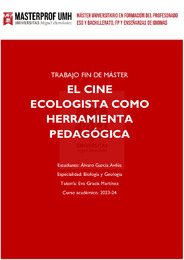Resumen :
Este trabajo explora la integración de cortometrajes ecologistas en la educación secundaria, específicamente en la enseñanza de biología y geología. Para ello se ha realizado una revisión bibliográfica que muestra la validez educativa del uso del cine como herramienta pedagógica. También se muestra la viabilidad e integración en el currículo de biología y geología, utilizado como ejemplo los cortometrajes del festival CINECO, evaluando su consonancia con los Objetivos de Desarrollo Sostenible (ODS) de la Agenda 2030 y comparándolos con los cortometrajes ofrecidos por el Ministerio de Cultura y Deporte en la plataforma AulaCorto y la plataforma Platino Educa. También se plantea como propuesta práctica un proyecto pedagógico significativo, un Aprendizaje Basado en Proyecto (ABP) siendo un cortometraje el producto final. El resultado del presente trabajo muestra que los cortometrajes del festival CINECO, debido a su corta duración y relevancia actual, son ideales para proyectarse en el aula y estimular debates significativos. Conjuntamente, están alineados con los contenidos curriculares y están en consonancia con los ODS de la Agenda 2030 y la nueva ley educativa LOMLOE. Por lo tanto, el uso de cortometrajes como herramienta pedagógica para elaborar metodologías de aprendizaje activo, como debates en el aula y un ABP enriquece la experiencia educativa, fomenta el pensamiento crítico y la sensibilización sobre temas medioambientales.
This master’s final project explores the integration of ecological short films in secondary education, specifically in the teaching of biology and geology. To this end, a literature review was conducted, demonstrating the educational validity of using cinema as a pedagogical tool. The feasibility and integration into the biology and geology curriculum are also shown, using as an example the short films from the CINECO festival, evaluating their alignment with the Sustainable Development Goals (SDGs) of the 2030 Agenda and comparing them with the short films offered by the Ministry of Culture and Sports on the AulaCorto platform and the Platino Educa platform. Additionally, a practical proposal is presented, a significant pedagogical project, a Project-Based Learning (PBL) initiative, where a short film is the final product. The results of this work show that the short films from the CINECO festival, due to their short duration and current relevance, are ideal for screening in the classroom and stimulating meaningful debates. Furthermore, they are aligned with the curricular content and the SDGs of the 2030 Agenda and the new educational law LOMLOE. Therefore, using short films as a pedagogical tool to develop active learning methodologies, such as classroom debates and a PBL, enriches the educational experience, fosters critical thinking, and raises awareness about environmental issues.
|
 La licencia se describe como: Atribución-NonComercial-NoDerivada 4.0 Internacional.
La licencia se describe como: Atribución-NonComercial-NoDerivada 4.0 Internacional.
.png)
